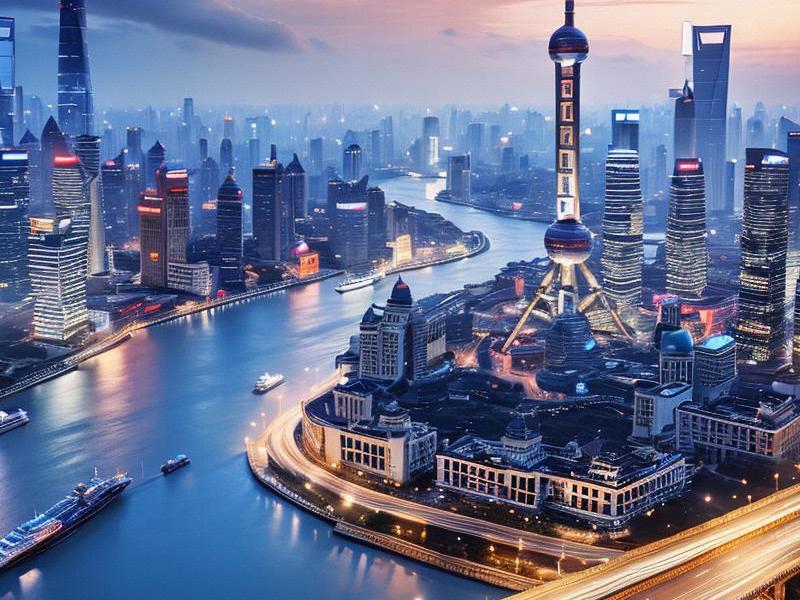
Shanghai, often referred to as the 'Pearl of the Orient,' stands as a beacon of China's economic and cultural resurgence. This dynamic metropolis, with its skyline punctuated by the iconic Oriental Pearl Tower and the futuristic Shanghai Tower, is not just a city; it's a testament to China's transformation over the past few decades.
The history of Shanghai is deeply intertwined with its strategic location at the mouth of the Yangtze River. Once a small fishing village, Shanghai's rise began in the 19th century when it was opened up to foreign trade following the First Opium War. This marked the beginning of its transformation into a cosmopolitan city, with concessions established by various foreign powers that brought with them a mix of architectural styles and cultural influences.
Today, Shanghai is a global financial center, ranking alongside New York and London. The city's Pudong district, once a rural area, has been transformed into a symbol of China's economic prowess, with the Lujiazui financial district housing some of the world's tallest skyscrapers. The Bund, on the other side of the Huangpu River, showcases a blend of colonial architecture and modern skyscrapers, offering a glimpse into the city's rich history.
Shanghai's economic success is not solely based on finance; it is also a hub for trade, manufacturing, and technology. The city has been at the forefront of China's technological advancements, with areas like Zhangjiang High-Tech Park becoming home to numerous startups and research institutions. This focus on innovation has positioned Shanghai as a leader in fields such as artificial intelligence, biotechnology, and information technology.
Culturally, Shanghai is a melting pot of traditions and modernity. The city is known for its vibrant art scene, with galleries and museums like the Power Station of Art showcasing contemporary Chinese art. Traditional Chinese opera, especially the Shaoxing opera, continues to be performed, preserving the city's cultural heritage.
上海私人品茶 Shanghai's culinary scene is another aspect that reflects its cosmopolitan nature. From the famous Xiaolongbao (soup dumplings) to the sophisticated French cuisine found in the city's many restaurants, Shanghai offers a culinary experience that caters to all tastes. The city's night markets and food streets are popular among locals and tourists alike, providing a taste of the authentic Shanghai flavors.
The city's commitment to sustainability and green development is also noteworthy. Initiatives such as the construction of green buildings, the expansion of public transportation, and the promotion of electric vehicles are part of Shanghai's strategy to reduce its carbon footprint and improve the quality of life for its residents.
Shanghai's international influence is evident in its role as a host to major global events. The city has successfully hosted the World Expo in 2010, attracting millions of visitors from around the world. This event highlighted Shanghai's ability to organize large-scale international events and its commitment to fostering global dialogue and cooperation.
The city's education system is another area where Shanghai excels. Its universities, such as Fudan University and Tongji University, are renowned for their academic excellence and research capabilities. Shanghai's education sector plays a crucial role in the city's development, producing a highly skilled workforce that drives innovation and economic growth.
上海花千坊龙凤 Shanghai's real estate market is a reflection of its economic vitality. The city's skyline is a testament to the rapid urbanization and the high demand for housing and commercial spaces. However, this has also led to challenges such as rising property prices and the need for sustainable urban planning.
The city's transportation network is one of the most efficient in the world, with the Shanghai Metro being a key component. The metro system not only facilitates the movement of millions of residents daily but also serves as a model for other cities looking to develop their public transportation systems.
Shanghai's cultural and creative industries are thriving, with the city being home to numerous fashion designers, artists, and filmmakers. The city's fashion week and film festivals attract international attention, showcasing the creativity and talent that thrive in Shanghai.
The city's government has been proactive in addressing the challenges of urbanization, such as housing shortages and environmental concerns. Initiatives such as the construction of affordable housing and the promotion of green spaces are part of the city's efforts to crteeaa more livable environment.
爱上海419 Shanghai's role in global governance and diplomacy is also significant. The city is home to the China International Import Expo (CIIE), an annual event that promotes international trade and economic cooperation. Shanghai's leadership in this area underscores its importance as a global player.
The city's future looks promising, with plans for further development and modernization. The expansion of the Shanghai Free-Trade Zone and the ongoing construction of the Hongqiao Business District are expected to enhance the city's role as a global hub for trade and finance.
In conclusion, Shanghai is a city that embodies the spirit of China's transformation. Its rapid urban development, vibrant cultural scene, and commitment to innovation make it a unique and dynamic metropolis. As Shanghai continues to grow and evolve, it remains a symbol of China's rise on the global stage and a source of inspiration for cities around the world.
